
















|
Sydney: The Olympic
and Paralympic Post - Mortem
Story and photos by Peter Cummins
In the Pattaya Mail of 15 September (Volume VIII,
#37: Sydney and the Olympics), our special correspondent Peter Cummins wrote
about visiting Sydney for the first time in 44 years, about a city in the
last frenzy of preparing for the twenty-seventh Olympiad, the first of the
new millennium. That is now history and almost three billion viewers
world-wide agreed that the Australians had turned on, in the words of
outgoing International Olympic Committee President Juan Antonio Samaranch,
“the best Olympics ever.”
 Sydney:
what a beautiful city to enjoy. Darling Harbour at night. Sydney:
what a beautiful city to enjoy. Darling Harbour at night.
On that occasion, while Australia was still basking in
the glow of “Olympic euphoria”, Peter reported on a country which has
undergone tremendous changes in this intervening half-century. But he
remains convinced that Australia still has not attained to a real
nation-hood, in spite of the country’s uniqueness and its huge success on
the Olympic stage.
 Another
view of Darling Harbour Another
view of Darling Harbour
Then, just prior to the opening of the Tenth Paralympic
Games last week, he sensed a despondency, a lack of direction; or, as one
writer described it: “Is there a ‘quick-fix’ for the massive
post-Olympic hangover gripping the country?”
Here are some random thoughts on the Paralympics and
Australia.
The Tenth Paralympics
The Paralympics, opening some three weeks after the
Olympics, came as a welcome respite. In what has been described as a
“Post-Olympic depression”, Australians were reeling from an oft-revealed
self-deprecating mood, the plunging Australian dollar and the faltering
momentum of reconciliation with the indigenous people whose athletic feats
had thrilled the world.
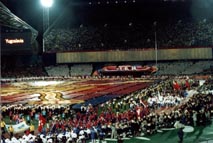 Paralympic
Games opening ceremony Paralympic
Games opening ceremony
The ocean of woes that had been put aside during the
heady days of the Olympics when the whole country went on an orgy of
self-praise and a nationalistic fervour reaching jingoistic proportions,
were temporarily subdued again.
The Australians, indeed, forgot their troubles when
thousands of athletes, many severely impaired, came to Sydney from the far
corners of the world to compete in the Games - often a daunting journey even
for the able-bodied.
They took to the arenas and the waterways in an
unforgettable display of courage, challenge, spirit and skill. The
Australian paralympians totally dominated the Games but, the Thai team, too,
did the Kingdom justice, winning four Gold medals. Pattaya’s own Supachai
Koysub won the 200 metres wheelchair event in a record-breaking time and
Prawat Wahoram won Gold in a spectacular record-breaking 10,000 metre
wheelchair final.
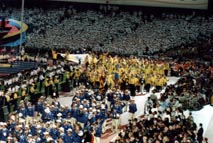 The
teams wheel past at the Paralympics The
teams wheel past at the Paralympics
No one who saw it will ever forget the wheelchair
basketball and the tenacity, speed and consummate skill of the competitors.
And it was fierce competition, with collisions and confrontations, as the
rival teams raced up and down the court at a tremendous pace. Right in front
of the photographers’ floor-level area, a collision caused both players to
over-turn in a total 360-degree configuration, land upright and return
straight back into the fray.
 The
women’s 100 metre wheel-chair race The
women’s 100 metre wheel-chair race
The start of the men’s 100-metres final saw a line-up
at the blocks of the competitors with their artificial limbs. The fastest
time was an incredible 11.3 seconds, upon which the winner, with huge white
teeth and a grin that rivalled the sun, punched the air in typical style,
danced and waved his carbon-fibre leg. The huge crowd went totally berserk
and the athletes loved it.
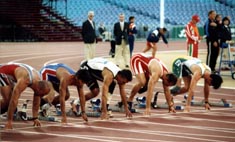 On
the starting blocks: Men’s 100 metre sprint On
the starting blocks: Men’s 100 metre sprint
Two participants came in from a Pacific Island country to
compete – on artificial homemade bamboo legs. It was a very short time
only before, according to the officials involved, with broad smiles all
around, “we had them fitted out with ‘state-of-the-art’ carbon-fibre
jobs and some very up-market sporting outfits.” The athletes were too busy
showing off their new legs to worry about honours for their country.
Sailing, too
Sailing was, of course, a focus of my interest and it was
off to Rushcutter’s Bay to a superbly-organized marina adjoining
Sydney’s Cruising Yacht Club. There were two classes of yacht, the
three-person Sonar class and the tiny 2.4 metre class single-hander which
has been dubbed as the former America’s Cup 12-meter Class in
miniature”.
 A
helping hand into the 2.4 m. yacht A
helping hand into the 2.4 m. yacht
As Alan Kennedy, sailing correspondent for the Sydney
Morning Herald describes them: “From a distance, these superb little
craft look like a fleet of elegant, old-fashioned yachts. As they draw
closer, they start to ‘shrink’. By the time you are level, it seems that
a model yacht has been turned loose on Sydney Harbour. Then you notice a
person, head just above the level of the deck.”
Alongside the craft, parked on the pontoons, were the
wheelchairs of the sailors, many of whom were lifted up and gently lowered
into their craft by a small hoist.
 Wheelchair
basketball: fast and furious Wheelchair
basketball: fast and furious
This was, indeed, a new world for me and to see the
sophistication of these craft was an amazing experience. Of course, to
accommodate the lack of mobility of the sailors, rudder and all lines used
to adjust and control were centred within the tiny cockpit: mast rake, boom
vang, traveller, main and jib sheets. A weighted, fixed keel assured
stability and, though the boats are unsinkable (“Titanic”, anyone?),
they have been known to swamp occasionally.
It is almost like a sailing computer game and, according
to the experts, is the only yacht-racing class where the able-bodied and the
disadvantaged can both compete equally.
Just prior to the Paralympics I saw a documentary called
“Three Minutes from Glory”, directed by Briton David Goldie. It
is a brilliant account of the history of the Paralympic Games and the men
and women therein, which can only have a chastening effect on any viewer.
 The
2.4m mini-yacht: equal sailing for the able-bodied and the disadvantaged
alike The
2.4m mini-yacht: equal sailing for the able-bodied and the disadvantaged
alike
David pointed out in his introduction that he had always
wanted to do a documentary on the Paralympics, but was always side-tracked
by the bigger Olympiad. Then, right after the Barcelona Olympics and
Paralympics in 1992, he decided, adding the chilling realization that many
of the athletes of future Paralympic Games “had not yet had their
accident”. Wheelchair racers, 14-year-olds Christie Shelton and Holly
Lasmore, 16-year-old Angie Ballard and Peter Thompson, world yacht racing
champion in the 2.4 metre class all became victims after David’s 1992
portend.
Now, with an equally-successful - and difficult to manage
– Paralympics behind them, perhaps the national cloud will lift. In
Sydney, certainly, the citizens enjoy one of the world’s finest cities.
I returned 44 years after I left, to a jewel of a city
which, for the third time in successive years, has been voted as the
world’s best city to visit and the world’s best lifestyle city by a
number of international publications, including the prestigious US magazine Travel
and Leisure. The International Congress and Conventional Association
have just voted Sydney as “the World’s Number One Convention City”.
I feel convinced that the spirit of the Olympics and
Paralympics has become part of the public psyche and, perhaps, the flawless
staging of these two greatest events in the sporting world will give
Australia its rightful place as a the country of the future: in essence, its
nationhood.
(Next time: Vignettes from a voyager.)
14th Phuket King’s
Cup Regatta ready to sail
Anchors ‘a-weigh’ as Volvo ‘weighs’
in with sponsorship
Story and photos
by Peter Cummins
At a press conference for the forthcoming Phuket
King’s Cup Regatta, held at the Sheraton Grande Sukhumvit last week,
Karl-Johan Sandesjo, President of Volvo Car (Thailand) announced that
Volvo was joining the Regatta as principal sponsor this year, for the
first time.
 Volvo
chief, Karl-Johan Sandesjo (L) and regatta champion Bill Gasson pose under
the Volvo logo Volvo
chief, Karl-Johan Sandesjo (L) and regatta champion Bill Gasson pose under
the Volvo logo
Preparations for this annual tribute to HM the King of
Thailand are well advanced and, really, it’s only a matter of the
expected 100 entries to weigh anchor and go racing three weeks from now.
“We are proud to be at the helm of this year’s
Regatta,” the Volvo President informed the large gathering of press and
media representatives. “For more than three decades, Volvo has supported
many exclusive sports, thereby encouraging active, modern and dynamic
lifestyles, under our motto Volvo For Life,” he added.
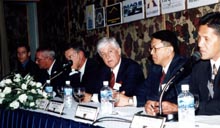 Nigel
Hardy (3rd right) runs the press conference - and the Regatta Nigel
Hardy (3rd right) runs the press conference - and the Regatta
“Sailing fits very well into our global sponsorship
strategy,” Mr Sandesjo continued, noting that Volvo has taken over
sponsorship from Whitbread of the quadrennial round-the-world yacht race.
Now known as the Volvo Ocean Race, it will start from Southampton in
September next year.
Nigel J. Hardy, president of the 2000 King’s Cup
Regatta organizing committee, outlined format changes for the 2000 event
aimed, as were changes in preceding years, to streamline and generally
enhance the spectacular event, incorporating the needs of the sponsors,
the participants, the spectators and, not the least, the press and media.
 Radab
Kanjana-Vanit goes every year to Phuket from his Sriracha base - as did
his late father Rachot. Radab
Kanjana-Vanit goes every year to Phuket from his Sriracha base - as did
his late father Rachot.
Two major innovations are that the 2000 Regatta will be
sailed, in its entirety, off-shore and in-shore along the Phuket Coast.
Thus, the Regatta’s “blue riband” event, the Volvo Andaman Sea Race,
will no longer sail from Koh Phi Phi but, rather, will be raced around Koh
Racha, the crown jewel in the beautiful cluster of islands close to
Phuket.
A second innovation, according to Andy Dowden, Regatta
vice president of racing, “is the introduction of a new division - the
Premier Cruising Class - to cater to the increasing number of super-yachts
which now ply regional waters”.
Added to another big fleet of state-of-the-art racing
yachts, crewed by some of the world’s best sailors, the vista of these
mega-yachts, racing under enormous spinnakers “will be awesome”,
contends Andy (press and media, please note!).
 (L.
to R.) Andrew T. Owen (Proteus), Andy Dowden (Regatta Committee) and
Karl-Johan Sandesjo (Volvo) (L.
to R.) Andrew T. Owen (Proteus), Andy Dowden (Regatta Committee) and
Karl-Johan Sandesjo (Volvo)
Even without major changes, it is interesting to note
that the recent “Event of the Year” award was granted to the Phuket
King’s Cup Regatta by the Thailand Incentive and Convention Association,
representing the first time that a yacht-racing event has been so
honoured.
H.E. Adisai Potharamik, minister attached to the Prime
Minister’s office in Charge of Tourism, presented the accolade at a
ceremony held recently at the Royal Cliff Beach Resort, Pattaya. William
J. Gasson, four times Phuket King’s Cup racing class champion, accepted
the award on behalf of the organizing committee.
 The
press conference panel in action The
press conference panel in action
Nigel Hardy also emphasized a new and exciting regional
yacht-racing development, the Asian Yachting Circuit, which will promote
the King’s Cup, along with other Asian yacht-racing events, “through
extensive world-wide television coverage. With a target audience in excess
of 400 million viewers, the benefits to the King’s Cup, our sponsors and
Thailand, generally, are enormous,” Nigel noted.
Andrew T. Owen from the Hong Kong-based Proteus group,
which is the driving force behind this regional development, explained
that this new concept is basically an expansion of the Sir Thomas Lipton
tri-regatta championship, encompassing Malaysia’s Raja Muda
International, the Phuket King’s Cup and the Singapore Straits Regattas.
 Bill
Gasson received the “Event of the Year” Award for the Phuket Regatta
Committee Bill
Gasson received the “Event of the Year” Award for the Phuket Regatta
Committee
The skipper and crew with the best aggregate placing
were awarded the Sir Thomas Lipton Trophy, donated by the tea magnate to
the then Royal Singapore - now the Republic of Singapore - Yacht Club. The
ornate solid silver cup was given to Sir Thomas by an adoring American
public for his superb sportsmanship and good-will, after losing five
challenges for the America’s Cup in the early 1900’s.
Now, Andrew pointed out, the annual San Fernando Race,
Hong Kong and the Philippines in mid-April, will become the fourth regatta
in the Asian circuit and, instead of the Lipton Cup being presented at the
Phuket King’s Cup, it will now be awarded in Hong Kong at the end of
April.
The Fourteenth Phuket King’s Cup Regatta will be
sailed over His Majesty the King’s seventy-third birthday week, from the
second to the ninth of December. Each year since the founding in 1987, the
Regatta is re-dedicated to honouring the birthday of the Regatta Royal
Patron who graciously bestows the handsome permanent King’s Cup on the
winners each year.
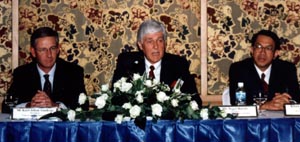 (L.
to R.) Karl-Johan Sandesjo, Nigel Hardy and Royal Varuna Flag Commodore
Rut Subniran address the Regatta press conference. (L.
to R.) Karl-Johan Sandesjo, Nigel Hardy and Royal Varuna Flag Commodore
Rut Subniran address the Regatta press conference.
Nigel was quick to express the gratitude of all
concerned with the Regatta, for the generous sponsorship, without which
there would be no event. Volvo, of course, and “the Regatta mainstays -
hosts Kata Beach Resort, QBE Insurers, Boonrawd Breweries, Thai Airways
and the Royal Thai Navy - all as much a part of the event as ever.” The
House of Kangaroo, said CEO John Beard, “was so pleased with its 1999
involvement that it even brought its European partners ‘aboard’ this
year.”
 The
Sir Thomas Lipton Cup: next stop Hong Kong. The
Sir Thomas Lipton Cup: next stop Hong Kong.
Other co-sponsors include Laguna Phuket, Sunsail, the
Boathouse Wine and Grill, the Phuket Island Resort and supporting sponsors
Neil Pryde, the Tourism Authority of Thailand, the Yacht Haven Marina,
Phuket.com, Don’s Cafe, Thai Marine Leisure, Phuket Water Taxis and
Thavorn Beach Village. Organizing Clubs are the Royal Varuna Yacht Club,
the Phuket Yacht Club and the Yacht Racing Association of Thailand.
The Phuket Magazine, Image Asia, and beverage sponsors
Boonrawd, Berlei Jucker and Pepsi will keep thirst at bay.
Among the many sponsors of the racing, the Boathouse
Wine and Grill at Kata Beach, adjacent to the Regatta’s home base, the
Kata Group, has the honour of hosting the race on the King’s birthday,
the fifth of December. This is most appropriate, for the designer and
owner of the splendid Boathouse, M.L. Tri Devakul is one of the Regatta
founders and has been a loyal and staunch supporter throughout the years
since then.
The Boathouse is planning a special event for the
evening which promises to be a spectacular “son et lumiere”. But, like
the superb opening ceremony of the 27th Olympiad at Sydney in September
which was kept “under wraps” until it actually happened, the Boathouse
celebration will be revealed only on the night of the fifth of December.
M.L. Tri does not expect to top the Sydney opening crowd of 110,000 but he
does expect an exciting event on the sands.
So, anchors a-weigh, on to Phuket and weigh-in at the
first King’s Cup Regatta of the new millennium.
Happy Landings
Social Commentary
by Khai Khem
How many times do we hear Western tourists, contract
workers and residents express their various impressions about their
experiences in Thailand? Some grumble and gripe, and lurch from crisis to
crisis. Others seem to settle into their new lives rather gracefully and
come to love it here.
Recently, a Western gentleman who works for a local
company in which I have many friends, handed in his resignation, and
announced that he was leaving Thailand and taking his Thai wife back to his
own country with him. This man had been living and working here for three
years and seemed pretty fed up. This couple was simple working class people
without wealth or exceptional education. It seems that his wife was the
object of frequent jibes and rude remarks from many fellow Thais because she
was married to a foreigner. Snide remarks from taxi drivers and shopkeepers
were a constant source of embarrassment to her, and anger to him. When this
couple travelled around Thailand, she was asked for identification when they
checked into the better hotels, just to prove she was actually married to
her escort, and not simply another “lady of the night”. She would
frequently insist that he not accompany her on shopping days, because to see
her with a Western man destroyed her chances of bargaining for a cheaper
price at the markets.
On and on went the list of abuses and insults which,
according to him, had been heaped on his beloved since he had married her.
He admitted that not all Thais were so closed-minded about his wife because
of her choice of husband. But the numbers of incidents were accumulating,
and he had had enough. Remarkably, his Thai wife was more philosophical, and
did not seem to feel as upset about these incidents as her husband did. What
bothered her more was her husband’s fluent comprehension of the Thai
language. Without it, these remarks would have passed unnoticed by him.
Then by chance, a few weeks later, I had an opportunity
to lunch with old friends, a Caucasian man and a Thai wife, who were in the
midst of celebrating the husband’s decision to apply for Thai citizenship.
This couple, both successful and well educated, had returned from various
postings overseas and were now very happy to be back home in Thailand. They
both wore that glow of satisfaction about them, which seems to radiate
optimism. I couldn’t help comparing the two couples; the first so
defeated, and the second full of rosy plans for the future.
I began to reflect on the concept of vantage points. Here
were two married couples who were living in the same place, who obviously
had many experiences and situations in common, but saw life here very
differently. Like birds sitting on different branches of a very tall tree,
they saw completely different views of the same scene. Each couple owned a
collection of psychological tools and materials with which they used to
forge out a lifestyle. But those tools were extremely varied, and the
selection of which ones to use differed greatly. So naturally the two
couples produced very different products according to their individual
craftsmanship. I couldn’t help wondering if the first couple hadn’t left
some of their coping tools to gather dust.
If one peels a large, cosmopolitan area like an onion,
one will find layer upon layer of lifestyles and collective experiences.
Some of these layers will characterise certain structural measurements.
These measurements are often geared to education, income, neighbourhood
culture, and pockets of power bases. That old clich้ about “birds of
a feather, flock together” may not apply these days so much to people of
the same race, colour and religion, as it does to persons who share the same
interests, lifestyles or behavioural patterns. Finding our flock today
depends more on developing our flying skills than it requires being an
indigenous species of the region. Rather than fly blind, we need to file a
good flight plan and learn to enjoy the view, whichever slipstream we glide
through. As for our two couples, here’s hoping they both have happy
landings.
European Pattaya
promoters win Friends of Thailand awards
The Friends of Thailand Awards, held under the umbrella
of the Tourism Authority of Thailand (TAT), are part of the Thailand
Tourism Awards. This year was the 40th anniversary of the TAT, so the
awards ceremonies were even more significant than normal.
The TAT is very cognizant of the fact that the
reputation of this nation depends to a large part on the information
disseminated to the world at large. Pattaya in particular, still labours
under a bad reputation from the past, which some journalists are still
milking for every last salacious drop. This, of course, is done to assist
their bank accounts, not to assist Pattaya.
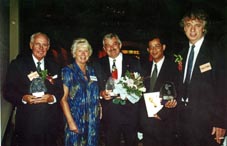 (L
to R) Vagn Christensen, Ingrid Christensen, Johny Reimer, Manit Boonchim
Director of Tourism Authority of Thailand, Pattaya and Yan Friis (L
to R) Vagn Christensen, Ingrid Christensen, Johny Reimer, Manit Boonchim
Director of Tourism Authority of Thailand, Pattaya and Yan Friis
However, there are some people in the world who have
been doing their best for Pattaya, and in some cases, for the
underprivileged in Pattaya. This has not been done for personal gain, but
has been done to help Pattaya, as a friend would lend assistance when
required. These people are then true Friends of Thailand, and we have
singled out those recipients who are also Friends of Pattaya.
The first of these is Mr. Vagn Christensen, a retired
SAS airline Captain who established the “Friends of Pattaya Orphanage
Foundation” in Denmark. Over the last twenty years he has sent several
million baht to the Pattaya Orphanage. After retiring, Mr. Christensen
established a small travel agency, Mols Rejser, and he now together with
his wife Ingrid arranges Thailand holidays for the Danish sponsors of the
orphanage. Mr Christensen’s tireless work for the Pattaya Orphanage and
his efforts to show his fellow Danes the beautiful Thailand he came to
love is the reason for TAT awarding him their prestigious “Friend of
Thailand award 2000”.
The second is Mr. Johny Reimer, from the Danish rock
band “The Clifters”. He has likewise given his support to the Pattaya
Orphanage through fund raising concerts. In the last few years these
concerts have been well attended in Pattaya as well as in his native
Denmark. Mr. Reimer has also been on a number of Danish television
programmes where he has promoted Thailand as his favourite tourist
destination.
 Volker
Klinkmueller Volker
Klinkmueller
The third is Mr. Yan Friis, a 48-year-old Norwegian
journalist, and a staff writer with the Norwegian weekly lifestyle
magazine Vi Menn (600,000 readers every week). In addition, he has a
weekly talk show on national radio, and this year published a third book
on a humorous look at life with a chapter on Norwegian tourists in
Thailand.
Mr Friis has taken a positive stand on the fight
against paedophilia and child prostitution, showing what is being done,
the problems and the solutions. At no time has he resorted to
sensationalising the problem. In his own words, “I am not among the
journalists who advise people to stay away from Pattaya city. I regard
Pattaya as the perfect resort for family holidays, and I have great
respect for the way the city is trying to change its image.”
The fourth Friend of (Pattaya) Thailand Award recipient
was Mr. Volker Klinkmueller, a 39-year old journalist from Hamburg, in
Germany, who reports for more than 20 major German newspapers about
Thailand, Vietnam, Laos, Cambodia and Myanmar.
Mr. Klinkmueller is one of the very few foreign
journalists who started early with objective and positive reports about
our seaside resort. In this way he has proven to be a real trendsetter for
an improvement of Pattaya’s image in the printed media. The harsh
treatment meted out to Pattaya prompted the following report from him -
“It is really a pity to observe time and time again that concerning
Pattaya most foreign journalists infringe their ethical duty of
correctness. They prefer to focus almost exclusively on grubby subjects,
but leave all the other sides of the best known and largest seaside resort
of Southeast Asia completely unnoticed.”
Since 1993 he has managed to place reports in almost
all major German newspapers, covering Pattaya’s new infrastructure and
the desired image change. Another of his coups was placing a positive
Pattaya piece in the well-known German travel magazine Reise & Preise.
This had been the first time since the 80’s that a German travel
magazine dared to pick Pattaya. He has also revised the Pattaya chapter in
the German travellers’ Thailand Guide in a new, much more positive tone.
Pattaya is now promoted as a paradise for shopping, sports and gourmets as
well as the many new attractions which have come into existence over the
past years for family tourism.
It is through people such as these that Thailand in
general, and Pattaya in particular, can pick themselves up. These people
are true Friends of Thailand.
West Winds Workshop
Project
by Michael Mealyer
The Lodge Pattaya West Winds in its Community Charity
Drive this year has identified the Ban Poonsri Drug Rehabilitation Centre
in Pattaya as the beneficiary. In the past only cash contributions were
made to the Centre. The feeling amongst the members is that the provision
should not be limited to cash but should be interactive and ongoing, which
would identify the Lodge with the charity.
 RWM
Michael Mealyer and committee members of the Lodge Pattaya West Winds
during a preliminary visit to the drug centre to ascertain the feasibility
of setting up a workshop. Police Col. Jirat Pichitpai presented the lodge
with a holy “Luang Por Sothorn” Buddha image. RWM
Michael Mealyer and committee members of the Lodge Pattaya West Winds
during a preliminary visit to the drug centre to ascertain the feasibility
of setting up a workshop. Police Col. Jirat Pichitpai presented the lodge
with a holy “Luang Por Sothorn” Buddha image.
An interactive project would enable the Lodge to make a
charitable contribution of money, skills, materials and time. This process
would be more meaningful and rewarding to both the members of the Lodge
and the beneficiaries.
Recognition that the profiles of those with drug
problems in Pattaya were mainly teenagers between the ages of 14 and 20
years is a reminder of just how serious and debilitating drugs are as a
social problem. The data would seem to link with the limit of Thai
mandatory primary education up to the age of 13 years.
Research in the early 90s shows that secondary
education demands full financial responsibility from parents, which means
only 31% of Thai students progress to secondary education. This leaves 69%
of Thai youth with no secondary education.
With no skills, no prospects and little self esteem,
many teenagers turn to drugs. Whilst the well known organic drugs are
still common, there has been an exponential growth in the use of chemical
drugs like amphetamines, including the aptly named ‘Ya Ba’, with
devastating effects on Thai youth. Those with drug problems who have the
courage for rehabilitation, which on average lasts three months, have few
outlets at the Ban Poonsri Drug Rehabilitation Centre. Presently the
facilities they have allow them to play snooker, basketball or watch TV.
The philosophy of Lodge Pattaya West Winds is to match
their ability to provide charity. In this context the charity project for
the Drug Rehabilitation Centre has no fixed time agenda and is to be
called the ‘West Winds Workshop.’ The WWW Project should make best use
of the skills and resources of all the LPWW members to pass those skills
on. The charity from each member could take the form of any one of the
following: money, skills, materials and time or a combination of any to
suit each member of the Lodge. Initially the skills of wood and metal
craft will be taught but other skills are to follow. The Lodge also
welcomes the participation of non members including local Thai craftsmen
in the ‘West Winds Workshop’ project.
The BBC visits Pattaya
for a “Holiday”
A BBC television crew slipped in and out of Pattaya
last weekend, not on holiday, but filming for their “Holiday”
programme, hosted by the effervescent Toyah Willcox. They were based at
the Royal Cliff Beach Resort, a venue which the entire crew raved over -
and justifiably so - the rates for a 5 star resort such as the Royal Cliff
being so much cheaper than comparable places in Europe or the
Mediterranean, according to their Programme Director.
 MD
Panga Vathanakul and GM Andrew Wood welcome Toyah Willcox to the Royal
Cliff Beach Resort. MD
Panga Vathanakul and GM Andrew Wood welcome Toyah Willcox to the Royal
Cliff Beach Resort.
Toyah herself, a lady well known by all UK expats from
her pop star days, was also impressed and was looking forward to her one
day off here, so she could shop at leisure. Even after only two days in
Pattaya she commented on how relaxed she felt in the ambience of our
resort city.
It was indeed an honour to have her and the crew
amongst us, especially as they had come to promote the positive aspects of
holidays here, and not trying to sensationalize with a quick trip down the
back streets looking for sleaze, a ploy often used by so-called
“investigative” journalists.
We shall be looking forward to “our” edition of
BBC’s “Holiday” programme.
Copyright 2000 Pattaya Mail Publishing Co.Ltd.
370/7-8 Pattaya Second Road, Pattaya City, Chonburi 20260, Thailand
Tel.66-38 411 240-1, 413 240-1, Fax:66-38 427 596; e-mail: ptymail@loxinfo.co.th
|

The Rotary Club
of Jomtien-Pattaya

Skal
International

Pattaya
Fun City
By The Sea
|
 Sydney:
what a beautiful city to enjoy. Darling Harbour at night.
Sydney:
what a beautiful city to enjoy. Darling Harbour at night. Another
view of Darling Harbour
Another
view of Darling Harbour Paralympic
Games opening ceremony
Paralympic
Games opening ceremony The
teams wheel past at the Paralympics
The
teams wheel past at the Paralympics The
women’s 100 metre wheel-chair race
The
women’s 100 metre wheel-chair race On
the starting blocks: Men’s 100 metre sprint
On
the starting blocks: Men’s 100 metre sprint A
helping hand into the 2.4 m. yacht
A
helping hand into the 2.4 m. yacht Wheelchair
basketball: fast and furious
Wheelchair
basketball: fast and furious The
2.4m mini-yacht: equal sailing for the able-bodied and the disadvantaged
alike
The
2.4m mini-yacht: equal sailing for the able-bodied and the disadvantaged
alike Volvo
chief, Karl-Johan Sandesjo (L) and regatta champion Bill Gasson pose under
the Volvo logo
Volvo
chief, Karl-Johan Sandesjo (L) and regatta champion Bill Gasson pose under
the Volvo logo Nigel
Hardy (3rd right) runs the press conference - and the Regatta
Nigel
Hardy (3rd right) runs the press conference - and the Regatta Radab
Kanjana-Vanit goes every year to Phuket from his Sriracha base - as did
his late father Rachot.
Radab
Kanjana-Vanit goes every year to Phuket from his Sriracha base - as did
his late father Rachot. (L.
to R.) Andrew T. Owen (Proteus), Andy Dowden (Regatta Committee) and
Karl-Johan Sandesjo (Volvo)
(L.
to R.) Andrew T. Owen (Proteus), Andy Dowden (Regatta Committee) and
Karl-Johan Sandesjo (Volvo) The
press conference panel in action
The
press conference panel in action Bill
Gasson received the “Event of the Year” Award for the Phuket Regatta
Committee
Bill
Gasson received the “Event of the Year” Award for the Phuket Regatta
Committee (L.
to R.) Karl-Johan Sandesjo, Nigel Hardy and Royal Varuna Flag Commodore
Rut Subniran address the Regatta press conference.
(L.
to R.) Karl-Johan Sandesjo, Nigel Hardy and Royal Varuna Flag Commodore
Rut Subniran address the Regatta press conference. The
Sir Thomas Lipton Cup: next stop Hong Kong.
The
Sir Thomas Lipton Cup: next stop Hong Kong. (L
to R) Vagn Christensen, Ingrid Christensen, Johny Reimer, Manit Boonchim
Director of Tourism Authority of Thailand, Pattaya and Yan Friis
(L
to R) Vagn Christensen, Ingrid Christensen, Johny Reimer, Manit Boonchim
Director of Tourism Authority of Thailand, Pattaya and Yan Friis Volker
Klinkmueller
Volker
Klinkmueller RWM
Michael Mealyer and committee members of the Lodge Pattaya West Winds
during a preliminary visit to the drug centre to ascertain the feasibility
of setting up a workshop. Police Col. Jirat Pichitpai presented the lodge
with a holy “Luang Por Sothorn” Buddha image.
RWM
Michael Mealyer and committee members of the Lodge Pattaya West Winds
during a preliminary visit to the drug centre to ascertain the feasibility
of setting up a workshop. Police Col. Jirat Pichitpai presented the lodge
with a holy “Luang Por Sothorn” Buddha image. MD
Panga Vathanakul and GM Andrew Wood welcome Toyah Willcox to the Royal
Cliff Beach Resort.
MD
Panga Vathanakul and GM Andrew Wood welcome Toyah Willcox to the Royal
Cliff Beach Resort.
